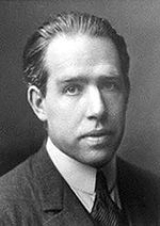
physicist
who made foundational contributions to understanding atomic structure and quantum mechanics
, for which he received the Nobel Prize in Physics
in 1922. Bohr mentored and collaborated with many of the top physicists of the century at his institute in Copenhagen
. He was part of a team of physicists working on the Manhattan Project
. Bohr married Margrethe Nørlund in 1912, and one of their sons, Aage Bohr, grew up to be an important physicist who in 1975 also received the Nobel Prize.
The great extension of our experience in recent years has brought light to the insufficiency of our simple mechanical conceptions and, as a consequence, has shaken the foundation on which the customary interpretation of observation was based.![]()
Isolated material particles are abstractions, their properties being definable and observable only through their interaction with other systems.![]()
Physics is to be regarded not so much as the study of something a priori given, but rather as the development of methods of ordering and surveying human experience. In this respect our task must be to account for such experience in a manner independent of individual subjective judgement and therefor objective in the sense that it can be unambiguously communicated in ordinary human language.![]()
Every valuable human being must be a radical and a rebel, for what he must aim at is to make things better than they are.![]()
How wonderful that we have met with a paradox. Now we have some hope of making progress.![]()

